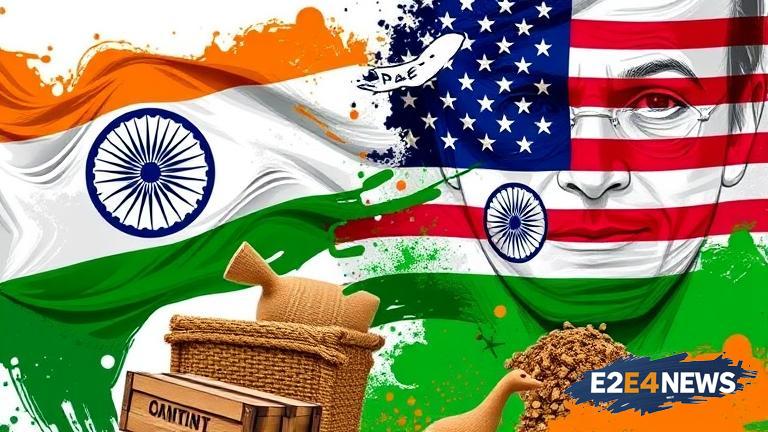The Indian economy is facing a major setback with the imposition of a 50% tariff on its exports to the US. This move is expected to have far-reaching consequences for India’s trade relations with the US and may lead to a significant decline in Indian exports. The tariff, which came into effect recently, has already started to disrupt the supply chain and is likely to impact various sectors, including textiles, pharmaceuticals, and IT. Indian exporters are scrambling to come to terms with the new tariff, which is expected to increase the cost of their products and make them less competitive in the US market. The Indian government has expressed its concern over the move and is exploring options to mitigate the impact. The US has cited concerns over India’s trade practices and intellectual property protection as the reason for imposing the tariff. However, India has denied any wrongdoing and has accused the US of protectionism. The dispute has the potential to escalate into a full-blown trade war, which could have serious consequences for both countries. The Indian economy is heavily dependent on exports, and a decline in exports could lead to a slowdown in economic growth. The US is one of India’s largest trading partners, and the tariff could impact bilateral trade worth billions of dollars. The Indian government has urged the US to reconsider its decision and has offered to negotiate a resolution. The US has, however, shown no signs of backing down, and the situation remains uncertain. The tariff has also sparked concerns among Indian businesses, which are worried about the impact on their operations and profitability. The Indian stock market has already reacted negatively to the news, with the rupee depreciating against the dollar. The situation is being closely watched by other countries, which are concerned about the potential impact on global trade. The World Trade Organization (WTO) has also been informed about the dispute, and a resolution is expected to be sought through diplomatic channels. The Indian government has assured that it will take all necessary steps to protect the interests of Indian exporters and will work towards finding a solution. The US has, however, made it clear that it will not compromise on its concerns over trade practices and intellectual property protection. The dispute has highlighted the need for India to diversify its trade relationships and reduce its dependence on the US. The Indian government has already started to explore new markets and is engaged in negotiations with other countries to increase trade. The situation is complex and multifaceted, and a resolution is not expected to be easy. The Indian economy is likely to face significant challenges in the coming months, and the government will need to take proactive steps to mitigate the impact. The US has also been accused of using trade as a tool to exert pressure on India to comply with its demands. The Indian government has, however, made it clear that it will not compromise on its sovereignty and will defend its interests. The dispute has the potential to impact not only trade but also diplomatic relations between the two countries. The situation is being closely watched by other countries, which are concerned about the potential impact on global trade and diplomatic relations.
